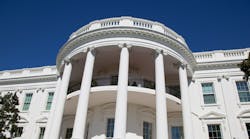In an afternoon ceremony on the south lawn of the White House, President Biden signed the Infrastructure Investment and Jobs Act into law. The act will allocate more than $1 trillion towards rebuilding U.S. infrastructure including roads, bridges, ports, and more. Biden signed the bill alongside Vice President Kamala Harris, senators from both parties and two union manufacturing workers. The law received praise from a number of manufacturing trade groups after it was signed.
Senator Rob Portman, a Republican Senator from Ohio, said the bill will have a positive effect on every single American. He credited the bill’s bipartisan appeal with the decision to remove what he called “human infrastructure” elements from the bill to focus on “core infrastructure” measures like roads and highways.
“This is what can happen when Republicans and Democrats decide we’re going to work together, to get something done,” said Portman.
From the Democratic party, House Speaker Nancy Pelosi and Vice President Kamala Harris compared the trillion-dollar bill to historic infrastructure projects like the Erie Canal, the Transcontinental Railroad, and the Interstate Highway System.
The bill notably includes the largest chunk of government funds earmarked for highway bridges since the original establishment of the interstate highway system and the most funds in a bill towards passenger rail since the founding of Amtrak.
In remarks made before signing the bill, Biden echoed Portman’s statement on bipartisanship, calling it “proof that despite the cynics, Democrats and Republicans can come together and deliver results.”
In a nod to Biden’s union-friendly politics, the ceremony featured two union-represented manufacturing workers. Opening the ceremony was Donnetta Williams, President of United Steelworker Local 1025 in North Carolina and an optical-fiber maker at Corning’s Wilmington, North Carolina, location. Williams noted that the bill contains $65 billion in spending to bring broadband to rural areas, making business for Corning and helping connect communities like the one she lives into the internet. Later, Biden’s own remarks were introduced by Heather Kurtenbach, a union activist and business manager for Iron Workers Local 86 from Seattle, Washington.
Kevin Dempsey, CEO of the American Iron and Steel Institute, specifically praised the infrastructure act for its “strong focus” on U.S.-made goods, including U.S.-made steel, which Dempsey notes in his statement “is cleaner and more sustainable than steel made in the other leading steel-producing countries.”
The National Electrical Manufacturers Association hailed the move while also calling on Congress to act on bolstering manufacturing supply chains. In a statement, NEMA CEO Debra Phillips said the signed infrastructure act is “a milestone” for modernizing the U.S. electric grid and improving on electric vehicle transportation infrastructure, but noted, “its promise will only be realized if our manufacturing, supply chain and regulatory systems are able to meet the coming demand.”
NEMA, she said, “looks forward to working with lawmakers on policies and programs that will fortify our nation’s manufacturing base, strengthen supply chain systems and streamline regulatory programs to support the creation of an electrified, connected, and sustainable future.”
Manufacturing Groups React
Input from manufacturing business groups began to pour in immediately following Biden’s signing of the bill, mostly positive despite concern about sustained levels of manufacturing demand.
Jay Timmons, CEO of the National Association of Manufacturers, called the new law “a model for future legislation” that achieved many of NAM’s stated infrastructure goals without raising taxes on manufacturers. “For manufacturers, this is a victory years in the making,” said Timmons in an association statement.
The bill is also expected to benefit truckers, as the largest item for new spending in the bill is the $110 billion earmarked towards improvements to U.S. roads and bridges. In a statement following the bill’s November 5 passage, Chris Spear, CEO of American Trucking Associations, noted that “roads and bridges are not political—we all drive on them.” Elsewhere in the transportation industry, the Truckload Carriers Association also praised the final version of the infrastructure bill for excluding language that would have raised liability insurance for independent contractors significantly. For more of the Infrastructure bill’s impact on trucking and shipping, see FleetOwner’s article, What the Largest Infrastructure Spending Bill in History Means for Trucking, here.
